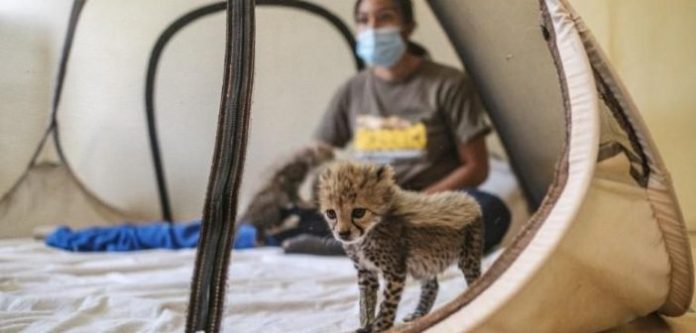Cheetahs are rapidly becoming extinct as the cub trade thrives.
Week-old cheetah cubs suckled from baby bottles and purred softly, their condition still perilously hazardous after being rescued from the illegal wildlife trade on the Horn of Africa.
Around half of the cubs rescued from traffickers die as a result of the ordeal, and there are serious fears for the tiniest of the bunch, a tiny youngster called “Green” who weighs just 700 grams (25 ounces).
“With Green, it was extremely touch and go,” Laurie Marker, founder of the Cheetah Conservation Fund (CCF), said while checking the mewling cub at the non-profit organization’s Somaliland rescue center.
They’re the lucky ones: an estimated 300 cheetah kittens are trafficked via Somaliland each year to affluent Middle Eastern purchasers looking for unusual pets.
Cubs who survive being kidnapped from their moms and trafficked out of Africa to war-torn Yemen and then on to the Gulf can sell for up to $15,000 on the illicit market.
It’s a bustling trade that’s less well-known than illegal markets for elephant ivory or rhino horn, yet it’s just as dangerous for Africa’s most endangered big cat.
There were an estimated 100,000 cheetahs on the planet a century ago. Human encroachment and habitat damage have reduced their numbers to just 7,000 today.
The ongoing poaching of cubs from the wild to feed the pet trade only adds to the decline.
According to research published this year that revealed hundreds of adverts for cubs on social media sites such as YouTube and Instagram, more than 3,600 live cheetahs were unlawfully sold worldwide in the decade leading up to December 2019.
“If this continues, that kind of offtake will cause the population to go extinct in a very short time,” said Marker, a cheetah expert.
Since the Roman Empire, cheetahs have been regarded as pets and hunting companions, and raising them in captivity is famously difficult, so wild-caught kittens are the only choice.
Changes in attitudes in rich Gulf states, the main buying market where cheetahs are still prized status symbols, have been a focus of the fight to end the modern-day trade.
According to Marker, wealthy owners enjoyed taking photos with their cheetahs just as much as they did with their automobiles and cash.
“There’s a competitive element to it, as well as bragging rights. Do not ‘like’ this kind of thing on social media, is one of our messages “Marker remarked.
Combating the illegal trade in Somaliland, a self-declared republic with no international recognition and one of the world’s poorest places, is extremely difficult.
With 850 kilometers, it’s roughly the same size as Syria (530 miles). The Washington Newsday Brief News is a daily newspaper published in Washington, D.C.
The Washington News Day































